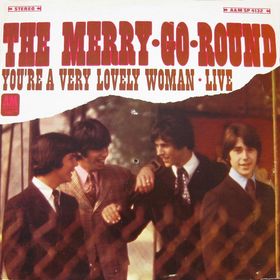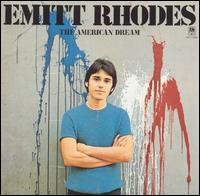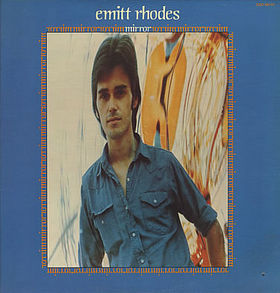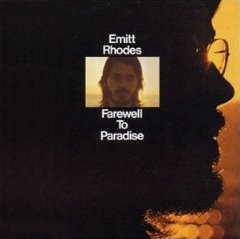Emitt Rhodes
Whom Time Will Show the Wiser.
Albums
Reviewed: Live, The American Dream, Emitt
Rhodes, Mirror, Farewell to Paradise.
Emitt
Rhodes was talented. (Hell, he probably still is.) Starting with
Los Angeles folk-rock band, Rhodes soon made a name for himself as a
one-man pop band drawing heavily from Rubber Soul through White Album
era Beatles. I find it tempting to nail Rhodes to his McCartney
"inspired" success with his self-titled debut, but Rhodes actually
moved through several phases in his brief pop career: from The
Merry-Go-Round's folk-rock, to the expansive sounds of The American Dream through to the more esoteric pop of his final album, Farewell to Paradise.
Still, Rhodes' forte were songs obviously indebted to someone
else, and it appears he struggled to establish his own voice in his
work. To the extent you can hear it, it is the sadness and
weariness of the onerous contract which gave him mental health problems
and prematurely ended his recording career. Emitt Rhodes is where those interested should begin.
 The
Merry-Go-Round: You're a Very Lovely Woman / Live (Nov. 1967),
***1/2
The
Merry-Go-Round: You're a Very Lovely Woman / Live (Nov. 1967),
***1/2
Not a live
album, but an uninspired
pairing of songs in the title. (Did the label think
people would mistake it for a single?). Regardless, Lovely Woman
marks
Emitt Rhodes' debut as a singer and songwriter, and it's quite a
statement. For people
familiar with Rhodes, the voice and harmonies will sound familiar, but
the sound less so: clearly an outgrowth of American folk-rock, struck
through with pre-psychedelia Beatles - two slightly twangy guitars,
bass and drums.
Compared with Rhodes' later, intricate arrangements, the
sound is
contained; but the Go-Rounders were rather polished - bassist Bill
Rinehart had played with the Leaves (the originators of "Hey Joe") and
both he and drummer Joel Larson also had played with Gene Clark. (Lead
guitarist Gary Kato was a friend of Rhodes).
Lovely
Woman is
obviously indebted to others - Rubber
Soul-era Beatles, the Byrds, even
the Buffalo Springfield ("On Your Way Out") and the Left Banke.
In other words, the band very nearly lacks a distinct
identity. Yet,
they made some great music, as the secret to a great pop song is not
the overall sound, but a good melody. Rhodes'
songs often
have more than enough merit to avoid being theft or even mere tribute -
the excellent straight folk-rock songs could have fit on an early Byrds
album ("Live" and "Have to Run Around"). Even when their
Beatles
admiration is open, his melodies give the songs personality, such
the humorous "Gonna Fight the War" or "Where Have You Been All My
Life". The lesser ones are those where the band becomes sub-standard Beatles
clones ("We're In Love", "Gonna Leave You" being the most egregious).
They still have charm when doing this, unlike bands
like the
Aerovons, or the Moon. For all their obvious attention to
contemporary
charts, the band's magnum opus
- "Time Will Show the Wiser" - differs from the rest of Lovely Woman.
Opening with a brief backwards introduction, the track is
much closer
to straight folk (no drums, focused on acoustic guitar), but with
Rhodes' expansive faux-English harmonies, almost like a LA response to
the Left Banke. One of the best pop songs of the
period; if only the rest of the album were as
consistent.
The
Listen, Listen CD has all the
tracks on Lovely
Woman,
along with those on The
American Dream and the band's two
delightful, Beatles-inspired 1968 singles which went nowhere.
Fun fact: arranger Ian Freebairn-Smith later wrote the theme to Magnum
P.I.
 Emitt
Rhodes: The American
Dream (rec. 1969,
rel. 1971), ***
Emitt
Rhodes: The American
Dream (rec. 1969,
rel. 1971), ***
Rhodes
hired studio musicians to
record the American
Dream,
finishing out the Merry-Go-Round's contract. The label then
sat on it, releasing it after Rhodes'
successful debut. While Lovely Woman
concentrated on guitar-centric folk rock and his later songs heavily on
Beatles, American Dream
shows Rhodes exploring a variety of styles, making full use of his
hired hands. Almost every popular trend within pop gets an
outing on the album: West Coast sunshine pop ("Pardon Me"), lush
orchestration ("Come Ride, Come Ride"), a darkly baroque story ("The
Man He Was"), calypso? ("Mary, Will You Take My Hand") to
more
Merry-Go-Round like material ("Let's All Sing"). Rhodes had
also
started writing knock-offs of McCartney's piano ditties ("Holly Park"),
but he was fairly derivative - "In Days of Old" sounds like the Beatles
processed through the Bee Gees. Some of the attempts are not
as
expected - his quieter songs are weaker ("Someone Died") and one hopes
the fake blues-pop of "Textile Factory" is a joke. (The
original
LP also included the Merry-Go-Round's "You're a Very Lovely Woman").
Most of the album shows Rhodes' delightful ear for melody, but
it
is hard to identify Emitt Rhodes on an album which displayed his
influences so openly. Yet, his fans will want to hear this
to
hear him in a larger setting, even if his producer was responsible for the larger orchestration. Available on CD with Lovely Woman as Listen, Listen.
 Emitt
Rhodes (1970), ****1/2
Emitt
Rhodes (1970), ****1/2
After
finishing American
Dream, Rhodes spent months in a
shed behind his parents' house perfecting these songs, before rejoining
the fray. The hard work paid off: this is the album McCartney should
have made with his self-titled debut. Like McCartney, Rhodes played
all the instruments, and like the McCartney of yore he has an amazing
knack for pop hooks. Frankly, Rhodes sounds more like McCartney in
places than McCartney himself did in 1970. Rhodes had a fabulous
ability to recall the Beatles' piano-based power pop: the driving
piano, the understated drumming, the fuzzy guitar leads, the wondrous
harmonies and the bountiful joy. Although most of these songs are
pure pop bliss taking their lead from tunes like "Ob-La-Di
Ob-La-Da", Rhodes was not really a Beatles or McCartney
impersonator; he was too talented, and nobody will mistake him for
the real thing. Nor did the Beatles ever sustain this happy direction
for an entire album. Yet, the album contains plenty of
downright
gorgeous material ("With My Face on the Floor", "Somebody
Made for Me", "Promises I've Made" are my favorites).
The downside is that Rhodes was out-of-touch with his own time: this
album would have been perfect in 1967-68. As it was, it charted at
#29, but groups like Badfinger were already making
power-pop bigger and stronger. Rhodes also stuck mainly with
piano;
when he slows down and focuses on acoustic guitar he becomes a bit
too derivative ("Lullabye" where he does more of a Lennon
impression, "You Must Have"), and his guitar skills are
best confined to snappy lines, not extended outings (as on the darker
"Long
Time No See"). However, even accounting for these few
hiccups,
this album is awash in catchy songs, innocence and bliss. An amazing
feat, even more so for just one man.
 Emitt
Rhodes: Mirror (1971), ***
Emitt
Rhodes: Mirror (1971), ***
The
deal that made Rhodes a successful pop artist also caused his own
downfall, requiring him to deliver an album every six months. Given
that he spent nine months preparing his first album, he was forced to
cut corners, and the pace, pressure and resulting lawsuit eventually
drove Rhodes into depression. No surprise, then, that Rhodes'
approach was only a modest step forward, even if the result was
stagnation. The success of his debut was largely fueled by his
ability to write catchy songs in the Beatles' style, then presented
with his carefully tailored sound and delightful voice. Rhodes adopts
a slightly harder tone here, which can be very effective - the
chugging "Really Wanted You" is one of the album's
highlights - but often the songs' melodies are not up to the debut
("My Love is Strong"). At the same time, his lyrics have
taken a self-reflective and bitter turn. In fact the song "Bubblegum
the Blues" is a phrase which loosely applies to a good swath of
the album which has a bluesy or dark feel ("Side We Seldom",
"Better Side of Life", "Mirror", "Take You
Far Away"). Rhodes still has his gorgeous voice, and he employs
it well ("Bubblegum the Blues", the catchy "Birthday
Lady"), but this album sounds like an uninspired and downcast
White Album-era
Paul McCartney.
 Emitt
Rhodes: Farewell to
Paradise (1973), **1/2
Emitt
Rhodes: Farewell to
Paradise (1973), **1/2
Rhodes moved
further away from being a McCartney clone, but that compounded with the
laid-back tropes of the mid-70s make Farewell to Paradise a
muddled send-off. He was still a one-man band, but he added
more guitar, saxophone, even some background mellotron to his sonic
repertoire. Everything sounds lovely, but his evolution
places him somewhere between a singer-songwriter (the title track) and
fellow one-man pop machine Todd Rundgren ("Drawn to You"). Farewell is
encouraging in that Rhodes sounds best when exploring cooler, funkier
sounds such as on "Drawn to You", with its wah-wah guitar and sax
lines, or the bluesy "Nights are Lonely". The guitar
dominates Farewell, but Rhodes used piano is a more serious and
grandiose manner on songs like "Those That Die" or the introduction to
"Warm Self Sacrifice". Yet, he cannot escape his grounding in
the Beatles - both "Trust Once More" and "Warm Self Sacrifice"
evoke The White Album,
whether consciously or not. Nor does all his
genre-experimenting produce good results - "Blue Horizon" has an odd
mellotron/banjo pairing, and overall his songs are weak.
Rundgren may be the best comparison, but he lacks Rundgren's
playfulness or sense of humor, employing introspection with a few
attempts at political commentary ("Those That Die"). Still,
the world could always use another esoteric pop artist, and it is
unfortunate that Rhodes abandoned his recording career after this
album.
 The
Merry-Go-Round: You're a Very Lovely Woman / Live (Nov. 1967),
***1/2
The
Merry-Go-Round: You're a Very Lovely Woman / Live (Nov. 1967),
***1/2 Emitt
Rhodes: The American
Dream (rec. 1969,
rel. 1971),
Emitt
Rhodes: The American
Dream (rec. 1969,
rel. 1971),  Emitt
Rhodes (1970), ****1/2
Emitt
Rhodes (1970), ****1/2
